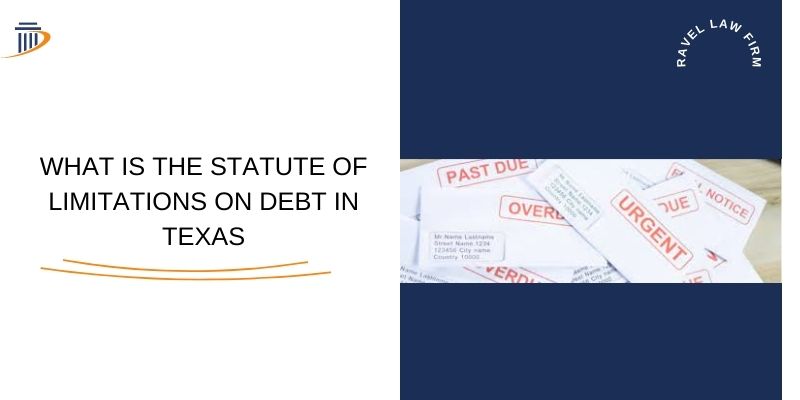Multiple safeguards are available to customers who are the targets of illegal debt collection practices. The time frame a business or individual may file a lawsuit against another. Once a certain period has passed, the statute of limitations bars creditors from suing debtors.
Collection efforts on a debtor’s part can be traumatic, especially if the debtor can still not pay off the amount. The inability to pay can have serious consequences. Still, several states, including Texas, have passed laws to safeguard residents in this situation.

Texas Debt Collection Act
The federal Fair Debt Collection Practices Act is the Texas Debt Collection Act, which applies only inside Texas (FDCPA). Both statutes forbid debt collectors from employing any form of harassment, abuse, or deception in their pursuit of debtors, intending to protect individuals from unfair collection techniques.
This strict Texas statute prohibits debt collection agencies, legal firms, or debt-buying corporations from making aggressive or violent phone calls to consumers to recover past-due debts. The TDCA also establishes a Texas statute of limitations for filing lawsuits to collect debts from borrowers.
Also Read: Statute of Limitations Michigan
What Is The Statute of Limitations On Debt In Texas?
In Texas, there is a four-year statute of limitations on lawsuits filed by creditors attempting to recover unpaid debts. This means that if a lender does not pursue legal action against a borrower for failing to make a loan payment within four years, the creditor loses the right to do so permanently. The statute of limitations may vary depending on the type of debt and the specific circumstances of the case. It is advisable to seek legal counsel to understand how the statute of limitations applies to your particular situation.
What if the Statute of Limitations has Passed In Texas?
The clock on Texas’s debt recovery statute of limitations typically ticks after the final payment or initial default on the obligation.
However, courts have sometimes extended the period to encompass the time it became evident or likely that the debtor would not be able to repay the obligation. To ensure that no stone is left unturned in defending yourself against a debt lawsuit, you need to retain the services of an experienced attorney who can assist you in making your case in the borrower-friendly laws of the State of Texas.
What Does the Statute of Limitations On Car Repossession Mean?
The statute of limitations in most states is between three and six years. A creditor or debt collector cannot sue you after this date. Sending a certified letter to a debt collector requesting that they cease contacting you is the only way to ensure they stop contacting you. Still, it does not cancel your debt or make the collection agency stop pursuing you for payment.
Furthermore, this does not rule out the possibility of having your car repossessed later. The vehicle will likely be long gone by then. Still, it’s important to note that the act only affects the time limit for filing a case, not for repossessions.
Legally, creditors in Texas have upto four years from the date of the default to file a lawsuit against a debtor who has defaulted on their payments. It’s important to remember that the clock starts ticking on the loan’s repayment obligations the moment the borrower defaults.
Thus, if you take out a car loan and fail to make payments for two years, the lender has four years to sue you to reclaim the debt. The two years of repayments you have already made do not contribute towards the statute of limitations.
Credit Card Debt in Texas
Currently, the average credit card debt for Texans is $6,999. That’s roughly $400 more than the average throughout the country, making it the ninth-highest total.
Card membership, utilization rates, delayed payments, and maxed-out credit all rank among the top in Texas, making it one of the highest in the country.
Can I use the Texas Statute of Limitations on Debt as a Defense?
Debts past the Texas statute of limitations may be used as a defense in particular situations. It doesn’t matter whether it’s been more than four years since the debt was acquired; the creditor can still file a lawsuit to try to get paid.
A creditor can still pursue repayment of a debt after four years under Texas law. Debt collection lawsuits are time-bound by the applicable statute of limitations.
You may have a defense under the Texas loan statute of limitations if a creditor sues you for an old debt. For the judge to rule in your favor, you must raise the active case of the debt’s expiration of the statute of limitations.

In certain circumstances, the limitation period may be extended. A judge may determine that the four-year period for launching a debt collection litigation starts from the time of your last payment if, for example, you start making installments after three years and then stop.
Check Also: Statute of Limitations Ohio
How Does Debt Settlement work In Texas?
Debt settlement is a method of reducing the principal balance owing on unsecured debts through negotiation. On average, debt settlement is quicker than aggregation or counseling in Texas.
The principal amount owed can be reduced by settlement, which is an additional benefit of reducing the interest rate. The percentage of debt that can be forgiven varies widely but can be as high as 65% in exceptional situations. Contrarily, the debt balance is unaffected by debt consolidation or credit counseling, only the interest rate.
Since most creditors would rather receive some money to end an account than nothing in a bankruptcy process, settlement is a viable source of debt relief.
FAQ’s
What can debt collectors not do in Texas?
Consumer debt cannot be collected through wage garnishment. A debt collection fraud may progress if a debt collector makes threats such as foreclosure or income garnishment. Immediately submit a formal complaint to our office. Research the various debt collection scams available online.
How long before credit card debt is uncollectible?
In California, most customer debts deriving from written contracts have a four-year statute of limitation. Borrowed funds, medical bills, and other unsecured debts are included here.

Hi, I’m Brian Gary; I have my Doctor of Juridical Science (SJD) degree from SMU Dedman School of Law in Dallas. Over the years, I have dealt with many families and successful corporate Legal cases. I have counseled many people on legal matters, and along with my profession, I write about Law on my blog. Please feel free to contact me for counseling/case discussion; I’ll be happy to help you.